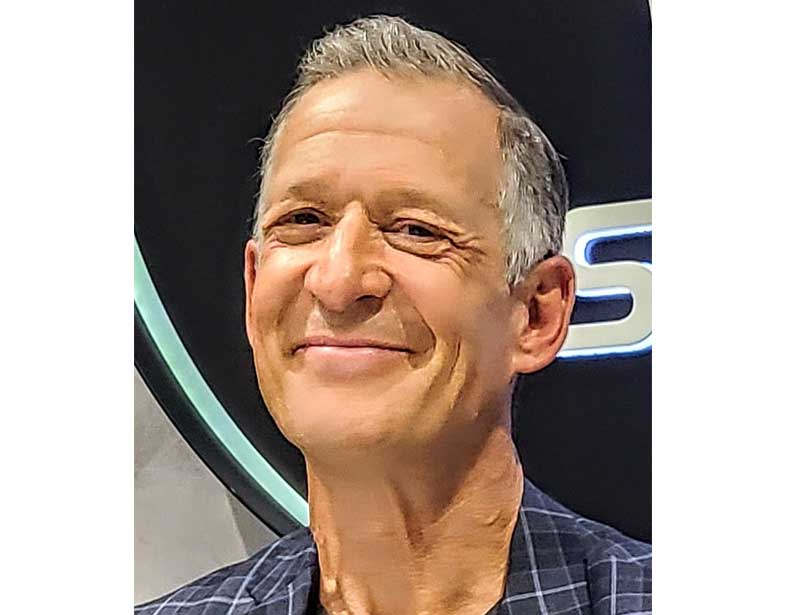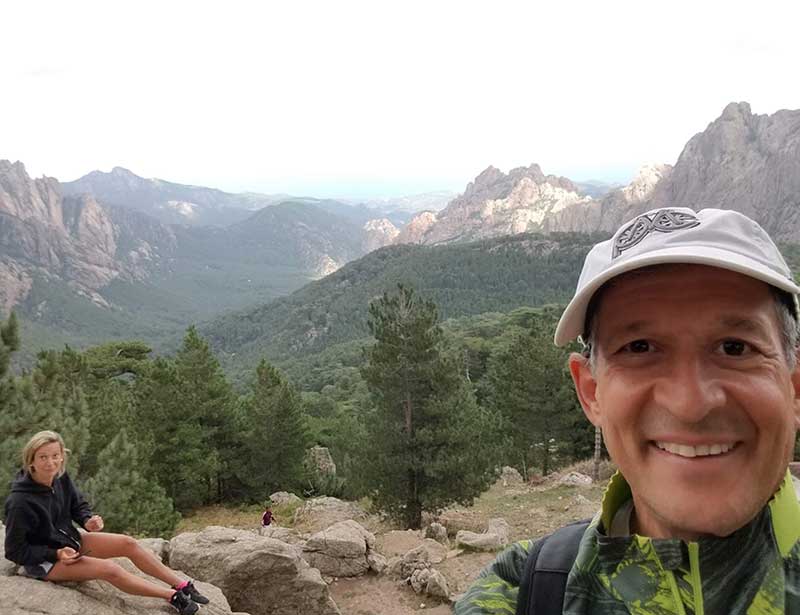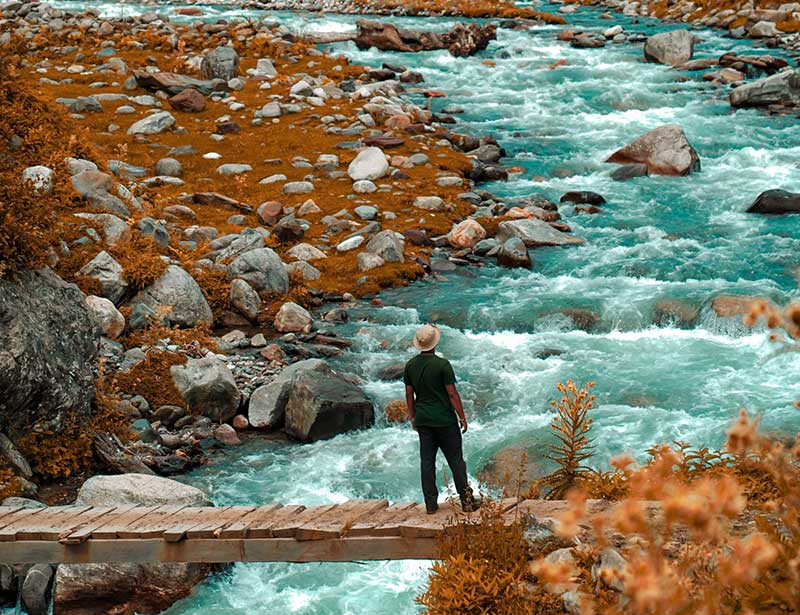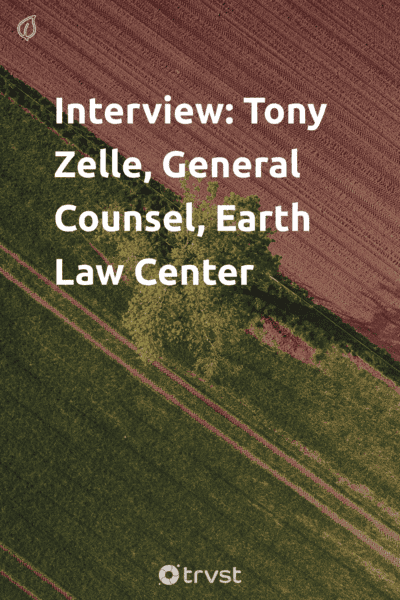Interview: Tony Zelle, General Counsel, Earth Law Center

Tell us about Earth Law Center; what was the vision in establishing it?
ELC was established in 2009 by Patricia Sieman, a lawyer and an Adrian Dominican Sister. Several years earlier, she advocated for affordable housing for migrant farm workers in Florida. While walking the land to be developed, she was concerned because she had heard that it might be a habitat for the endangered Florida Scrub Jay.
Sister Pat found herself saying: “Over my dead body, is some bird going to stop us from building housing for people in need.” She prayed that when the State surveyor showed up, there would be no Scrub Jays on the land. Her prayer was answered, and the housing was built.
Sometime later, Sister Pat was introduced to the work of Thomas Berry, a principal developer of the foundations of Earth jurisprudence. Earth jurisprudence is a philosophy of law and human governance based on the fact that humans are only one part of a wider community of beings and that the welfare of each member of that community depends on the welfare of the Earth as a whole.
The Adrian Dominican Sisters provided the initial funding for the Earth Law Center to unravel the destructive belief underpinning law and governance today that only human beings have subjective value, and all of Earth’s other beings, all that exists on Earth, are objects for human exploitation.
When I met Sister Pat in 2016, as she interviewed me as a candidate to serve on the ELC board of directors, our conversation delved into the ontology of separation, the idea that humans are separate from nature. While science developed decades ago debunked this myth, human societies and the global human economy continue to hold it as gospel.
Earth law is ecocentric and holistic. The laws developed by human beings are anthropocentric. The consequences of anthropocentric law will continue to accelerate the demise of Earth, an ecosystem, as a habitat capable of sustaining human life. The development of ecocentric law, Earth law, is an antidote. The dissolution of the ontology of separation is a critical vision for ELC.
2. How has Earth law evolved since it was founded in 2009?

I joined the board of ELC in 2016. At that time, ELC described itself as the “Champion for Rights of Nature.” However, despite the passage of the National Environmental Protection Act, the Clean Air Act, the Clean Water Act, and the Endangered Species Act between 1970 and 1972, there had been little progress in legally recognizing rights for nature.
And, of course, all attempts encountered well-funded adversaries backed by corporations and associations of corporate interests in the business of extraction and pollution. Through nearly fifty years of precedent, the administrative agencies designed to regulate extraction had been fully captured by those dependent on the permits issued by these agencies at both the federal and state level.
Nevertheless, ecocentric law was emerging in other contexts, and ELC focused on expanding the scope of Earth law practice and education. In 2021, ELC introduced Earth law into the mainstream of legal education by publishing Earth Law: Emerging Ecocentric Law— A Guide for Practitioners.
Making Earth law and Earth lawyers begins with education. The Earth Law coursebook is already being used in law schools and universities in the U.S., England, Canada, India, Israel, Japan, South Africa, Nigeria, and South Korea. ELC has offered a summer class since 2021, including over 200 participants from more than 60 countries.
ELC educates students, lawyers, scientists, musicians, artists, and professionals from all walks of life. Through Earth law education, ELC is fomenting a broader movement that coalesces social, racial, age, gender, and other movements that seek to give voice to the voiceless, in particular, nature and future generations.
ELC’s focus on education has coincided with significant legal developments led by students in climate change litigation. There are lawsuits worldwide based on the public trust doctrine and the right of future generations to a planet capable of sustaining human life. The Juliana case was the first in the U.S. to gain notoriety. More recently, in Held v. Montana, a trial court enforced the youth plaintiffs’ constitutional rights to a healthy environment and compelled the state to consider potential climate damage when approving public and private development projects.
3. Tell us about Earth Law Center’s River Campaigns

ELC’s movement lawyers and leaders have developed and propelled campaigns to give legal rights to rivers on five continents. To promote the establishment of rights for all rivers, ELC drafted and is working with experts worldwide to pass a Universal Declaration of River Rights.
Three of ELC’s most active current efforts involve establishing Rights for the River Ethiope in Nigeria, led by ELC’s Irikefe Dafe, a campaign led by Elizabeth Dunne in Washington State in the U.S. to protect the Elwha River and Legacy Forests and work by Elvir Causevic on a campaign calling for the Federation of Bosnia and Herzegovina to permanently protect the country’s last wild rivers from more than 400 small hydropower projects currently under construction or being planned.
On September 24, 2023, World Rivers Day, Dafe announced the launch of River Ethiope as a UNESCO-IRBM Ecohydrology Demonstration Center.
On June 30th, 2023, ELC, in collaboration with the Center for Whale Research and the Keystone Species Alliance, filed a legal action to challenge the Washington Board of Natural Resources’ wrongful approval of the “Power Plant” timber sale in the Elwha Watershed.
This campaign has the unique advantage of an alignment with the federal government, which has spent $350 million on the river restoration project, including approximately $50 million to remove two dams. The focus of the campaign is the prevention of state and county logging of a vast swath of legacy trees in the Elwha Forest, an activity whose hydrogeological impact would undermine the extraordinary regeneration of the Elwha River ecosystem that has occurred as a result of the federal project.
3. The Evros River (aka Meric, Maritsa) is Europe’s second largest river, which runs through three different countries - Greece, Bulgaria, and Turkey. The EU has fined it for excessive pollution. Evros has been flooding, it is polluted, and the largest wildfire in Europe’s history occurred in wooded areas along the Evros River. Do you have a campaign concerning the Evros River?
ELC is not currently working on a campaign involving the Evros River. However, the Evros River may benefit from ELC’s work on a broader level, which calls upon the European Union to:
- Recognize the rights of nature at the EU level with a focus on the rights of rivers and watersheds;
- End the classification of new hydropower as “renewable energy” in the context of the Renewable Energy Directive EU/2018/2001, the binding renewable energy target for 2030, and
- End all subsidies for small hydropower.
The current Directive perpetuates the fallacy that hydroelectric power is “renewable.” Hydropower is not renewable because it permanently degrades and destroys ecosystems and diminishes Earth’s capacity to sustain human life and livelihoods.
4. Tell us about your work concerning Ocean Rights.

While rights-based legal frameworks may not be the platform that restores balance to Earth’s life-sustaining capacity, there can be no legitimate argument that the Universal Declaration of Human Rights has effectively protected the most vulnerable human beings. Accordingly, ELC is leading a campaign for a Universal Declaration of Ocean Rights.
At the UN Ocean Conference 2017, ELC issued a call for action for governments worldwide to adopt a rights-based approach to ocean governance. More than 30 countries and hundreds of scientists and lawmakers have since followed ELC’s lead. The pace and force of this campaign were demonstrated on September 18, 2023, during the 78th session of the United Nations General Assembly in New York City. Ulisses Correia e Silva, the Prime Minister of Cabo Verde, announced:
“Today, we introduce a resolution at the United Nations, proposing the concept of ocean rights . . . to empower the ocean with a voice in decisions that affect her, strengthening human and economic rights and laying an ethical foundation for a sustainable future.”
Michelle Bender, Legal Counsel with Ocean Vision Legal, summarized the magnitude of this achievement and the inextricable connection between the health of the Ocean and the sustenance of life on Earth:
“Ocean rights is the recognition that the ocean is much more than a resource and that humankind has a responsibility to steward the ocean in a manner consistent with our interconnected relationship. . . .[UDOR will] improve implementation of international ocean governance by providing consistency and coherence through common standards and principles across all ocean-related frameworks. . . . move us away from the prevalent anthropocentric regulation of human activity by providing a legal foundation for ocean protection and accountability, . . . prevent irreversible harm before it occurs and foster a global wave of ocean guardians to ensure the Oceans interests are represented in decision making and dispute [resolution]."
Related read: Ocean facts.
5. Tell us about your nature on the board initiative.

ELC envisioned, conceived, and initiated the development of a board seat for Nature. Working with a UK eco-beauty company, Faith In Nature, ELC put the board seat for nature concept into practice. Alexandra Pimor, Director of ELC’s Nature Governance Agency (NGA), was the first human being to serve as a nature proxy on a corporate board.
ELC’s Nature On The Board project is a pioneering endeavor to expand the scope of nature-conscious governance in public, private, and non-profit organizations to foster nature-based governance praxes and empower decision-makers with the tools to make decisions for Nature, with Nature, as Nature.
ELC’s Nature Governance Agency debuted at the Convention on Biological Diversity in Montreal in December 2022. Its launch continued in January 2023, in Davos, during the World Economic Forum, when HubCulture announced that it would work with ELC to replace its entire board of directors with Nature.
Since then, NGA’s team has grown to include myself, Lucy Ward, and Pooja Sharma, with a handful of ELC interns excited to support us on this paradigm-shifting endeavor. The past year has gifted us with speaking engagements, workshop build-outs, and cross-collaboration opportunities with Nature forward businesses.
ELC’s NGA is currently engaged in a partnership with Context Nature to develop nature-based workshops and tools and build collaborative consulting services to meet corporate clients’ expectations and productize elements to on-ramp businesses into nature governance.
6. The UN came out with a Global Climate Litigation Report: 2023 Status Review Climate litigation represents a frontier solution to change the dynamics of this fight. As this report shows, people are increasingly turning to the courts to combat the climate crisis. Governments and private sector entities are being increasingly challenged and held to account. Children and youth, women’s groups, local communities, and Indigenous Peoples, among others, are also taking a more prominent role in bringing these cases and driving climate change governance reform in more and more countries worldwide. What are your thoughts and views?
My thoughts and views on the opportunity for climate solutions to be developed through the courts are shaped by my 30 years of litigation experience in state and federal courts in the U.S. at the trial and appellate levels.
Both federal and state judiciaries are powerful systems. No legitimate argument can be made for courts to continue to uphold the regulatory environmental protection systems that have utterly failed to curb the rate at which the capacity of Earth to sustain human life is being diminished. As long as the judiciary continues to self-limit its role in addressing the problems of climate change, Ocean acidification, freshwater depletion, deforestation, and desertification, it will be complicit in the failure of humankind to live with Earth’s geophysical and chemical planetary boundaries.
The remarkable difference between the utter failures of regulatory environmental litigation and the climate change litigation currently being pursued by children, on behalf of themselves and future generations, women’s groups, local communities, and Indigenous Peoples, is that the primary relief sought is not monetary damages (though that is certainly an important part).
Rather these lawsuits demand the courts to do what the legislative and executive branches of government have largely failed to do. Whether the theory is based on the public trust doctrine, on constitutional law, or on legislation at the local, state, and federal levels, the current ecocentric litigation is demanding a shift in the social, political, economic, and legal paradigms that have brought us to the edge of Earth’s demise as a system capable of sustaining human life.
There is no mistake in a court’s application of the political question doctrine (based on a highly technical legal concept called “standing”) to refuse to hear a case brought on behalf of nature or future generations or children who are too young to bring a case to court on their own behalf. Because, of course, it is up to the courts, in particular the highest court of any jurisdiction, to decide what a court is entitled to decide. When SCOTUS and the highest courts in other countries are prepared to accept that it is the responsibility of all systems of justice to preserve the Earth’s systems that support all biological life, the courts will begin to conclude that it is well within the province of the judiciary to protect the rights of posterity, of future generations of their citizens. As the preamble to the U.S. Constitution states, it is established to “secure the Blessings of Liberty to ourselves and our Posterity.”
Two excellent sources tracking ongoing climate change litigation are the Sabin Center’s Climate Change Litigation Database and the Eco Jurisprudence Monitor.
7. Recently, in Montana's landmark climate ruling: In a 103-page court order, Judge Kathy Seeley of the first judicial district court affirmed the plaintiffs' claim that a stable climate is included in a right to a “clean and healthful environment,” guaranteed in the state's constitution. The United Nations Human Rights Council and the United Nations General Assembly have recognized the right to a clean, healthy, and sustainable environment. We are seeing new claims centered around violating legislation related to net-zero targets, environmental impact assessments, advertising standards, and obligations under the Paris Agreement. Climate litigation has set precedents for climate action all over the globe, going beyond the jurisdictions in which they were brought and empowering and driving similar action in other countries. What are your thoughts concerning the Montana case?
In the Montana case, Judge Seely wrote a well-reasoned decision. Like the 11th Circuit Court of Appeals in Juliana and SCOTUS in Massachusetts v. EPA, the factual record established in the Montana cases crushes any meritorious assertion that the anthropogenic extraction, production, and consumption of fossil fuel is not the primary cause of climate change. Judge Seeley’s decision is emblematic of the judiciary’s role in dismantling the ontology of separation.
The appeal will provide an opportunity for the Montana government to square its environmental laws and permitting processes with the scientific realities of the sources of climate change. It might also encourage other states to pass constitutional amendments protecting posterity’s right to a healthy environment. Of course, there will be vehement opposition; however, who in their right mind will argue that their government should not have a duty to protect the habitability of the Earth for their progeny?
Above all, the Held decision empowers youth to effectuate the systemic changes required to move from the anthropocene epoch to the ecozoic era. It reinforces the commitment of ELC to education - of the youth, of judges, lawyers, lawmakers, and all others who seek to engage with peace in harmony with Earth. Humans evolved on Earth in the same way as all other biological life, in the same way, the Ocean materialized, in the way the land and its rivers and mountains came to exist.
As Thomas Berry wrote: “The Universe is a communion of subjects, not a collection of objects.” In this context, Berry asserts that rights neither originate from nor belong exclusively in the human realm. “Rights originate where existence originates.” Nature, the natural world, derives rights from the same source as humans: from the Universe that brought them into existence. From that basic premise flows the idea that human rights are a subset of a constellation of rights belonging to every member of the Earth community. As long as humankind continues to view itself as the master of the Universe (again, the ontology of separation is a belief thoroughly debunked by modern science), “rights” will remain a flawed legal construct in a system that is no longer equipped to serve the best interests of humankind.
8. Does your law center legally assist plaintiffs who have suffered damages due to environmental disasters? Can they reach out to Earth Law Center?
Yes, though ELC’s legal representation is primarily focused on proactive legal assistance to prevent imminent environmental damage, those interested in engaging ELC on matters in the United States may contact Elizabeth Dunne and, for matters in Latin America Constanza Prieto Figelist.
9. Which institutions does Earth Law Center collaborate with?
ELC collaborates with innumerable institutions, public and private, for-profit and non-profit. Three of the most important collaborators are the Center for Ecozoic Studies, an education, imagination, dialogue, and action center for an ecological age, Reef Life Foundation, and IntelliReefs, its for-profit coastal protection, coral restoration, and preservation business, and Context Nature, ELC’s partner in the development of its Nature-conscious governance business.
10. How can people reach you?
For general inquiries, please email info@earthlaw.org. To reach me directly, here’s my email: Tony Zelle
Selva Ozelli Esq, CPA is a legal and finance executive with diversified experience dealing with highly complex issues in the field of international taxation and related matters within the banking, securities, Fintech, alternative and traditional investment funds. Her first of its kind legal analyses involving tax laws, Foreign Corrupt Practices Act (FCPA), blockchain technology, solar technology and the environment and have been published in journals, books and by the OECD. Her writings have been translated into 15 languages.

